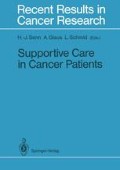Abstract
To work as a nurse or a physician in oncology is a stressful experience for a variety of reasons. Despite the fact that some malignancies are now curable even in advanced stages, a large proportion of cancers still have a bad prognosis. In this situation the professionals in the field of oncology have to acknowledge the limits of modern medicine. They may feel incompetent, helpless helpers, when confronted with an irresistibly advancing disease and ultimately death. They may not be able to cope with the multiple losses they are faced with in their daily routine. Cancer evokes anxiety and fear of death in all of us, including health care professionals. This is reflected by the fact that daily rounds with terminally ill patients are much shorter than those with patients who have curable disease [1]. In addition the staff has to apply toxic treatments. They have to make their patients sick first for an expected benefit later on. Furthermore they are confronted with a variety of complicated treatment regimens and a rapidly growing amount of knowledge in their subspecialty that is not easy to assimilate. Finally, complex issues of clinical research, where benefits for the individual patient may not be evident, have to be dealt with.
Access this chapter
Tax calculation will be finalised at checkout
Purchases are for personal use only
Preview
Unable to display preview. Download preview PDF.
References
Siegrist J (1982) Asymmetrische Kommunikation bei klinischen Visiten. In: Köhle K, Raspe HH (eds) Das Gespräch während der ärztlichen Visite. Urban and Schwarzenberg, München, pp 16–22
Maslach L (1976) Burned out. Hum Behav 5 (9): 16–22
Wise TN, Berlin RIVI (1981) Burn-out: stresses in consultation-liaison psychiatry. Psychosomatics 22 (9): 744–751
Jenkins JF, Ostchega Y (1986) Evaluation of burnout in oncology nurses. Cancer Nurs 9 (3): 108–116
Pasnau RO (1982) Role of psychiatry in multidisciplinary cancer care, education and research. In: Holland JC (ed) Current concepts in psychosocial oncology. Memorial Sloan-Kettering Cancer Center, New York, pp 13–16
Richards AI, Schmale AH (1974) Psychosocial conference in medical oncology. Ann Intern Med 80: 541–545
Wise TN (1977) Training oncology fellows in psychological aspects of their specialty. Cancer 36 (6): 2854–2857
Engel GL (1977) The need for a new medical model: a challenge to biomedicine. Science 196: 129–136
Engel GL (1980) The clinical application of the biopsychosocial model. Am J Psychiatry 137: 535–544
Morgan WL, Engel GL (1969) The clinical approach to the patient. Saunders, Philadelphia
Adler R, Hemmeler W (1986) Theorie und Praxis der Anamnese. Der bio-psycho-soziale Zugang zur Krankheit. Fischer, Stuttgart
Beck D, Bernhard J, Burgin D, Dreifuss E, Egli H, Gervasi A, Guex P, Gunn-Sechehaye A, Honsalek I, Hürny C, Meerwein F, Radanov B, Strauch I, Wildbolz A (1985) Das Erstgespräch auf der Abteilung für medizinische Onkologie. In: Bräutigam W, Meerwein F (eds) Das therapeutische Gespräch mit dem Krebskranken. Huber, Bern, pp 41–66
Balint M (1964) The doctor, his patient and the illness. Pitman, London
Kübler-Ross E (1969) On death and dying. Macmillan, New York
Herschbach P (1985) Psychosoziale Probleme und Bewältigungsstrategien von Brust-und Genitalkrebspatientinnen. Röttger, München
Lederberg M (1982) Support groups to prevent burnout. In: Holland JC (ed) Current concepts in psychosocial oncology. Memorial Sloan-Kettering Cancer Center, New York, pp 89–91
Goldberg RJ (1984) Disclosure of information to adult cancer patients: issues and update. J Clin Oncol 218: 948–955
Author information
Authors and Affiliations
Editor information
Editors and Affiliations
Rights and permissions
Copyright information
© 1988 Springer-Verlag Berlin·Heidelberg
About this paper
Cite this paper
Hürny, C. (1988). Psychosocial Support of Cancer Patients: A Training Program for Oncology Staff. In: Senn, HJ., Glaus, A., Schmid, L. (eds) Supportive Care in Cancer Patients. Recent Results in Cancer Research, vol 108. Springer, Berlin, Heidelberg. https://doi.org/10.1007/978-3-642-82932-1_35
Download citation
DOI: https://doi.org/10.1007/978-3-642-82932-1_35
Publisher Name: Springer, Berlin, Heidelberg
Print ISBN: 978-3-642-82934-5
Online ISBN: 978-3-642-82932-1
eBook Packages: Springer Book Archive

